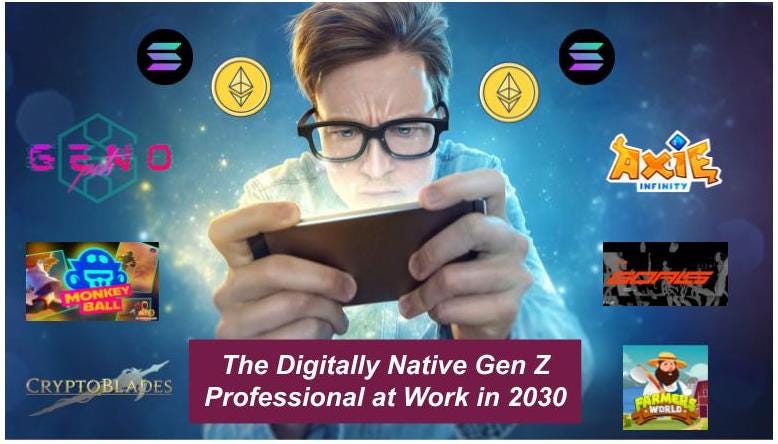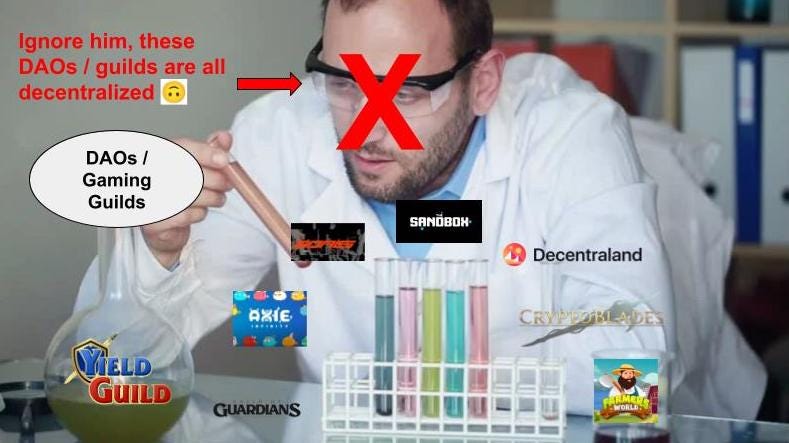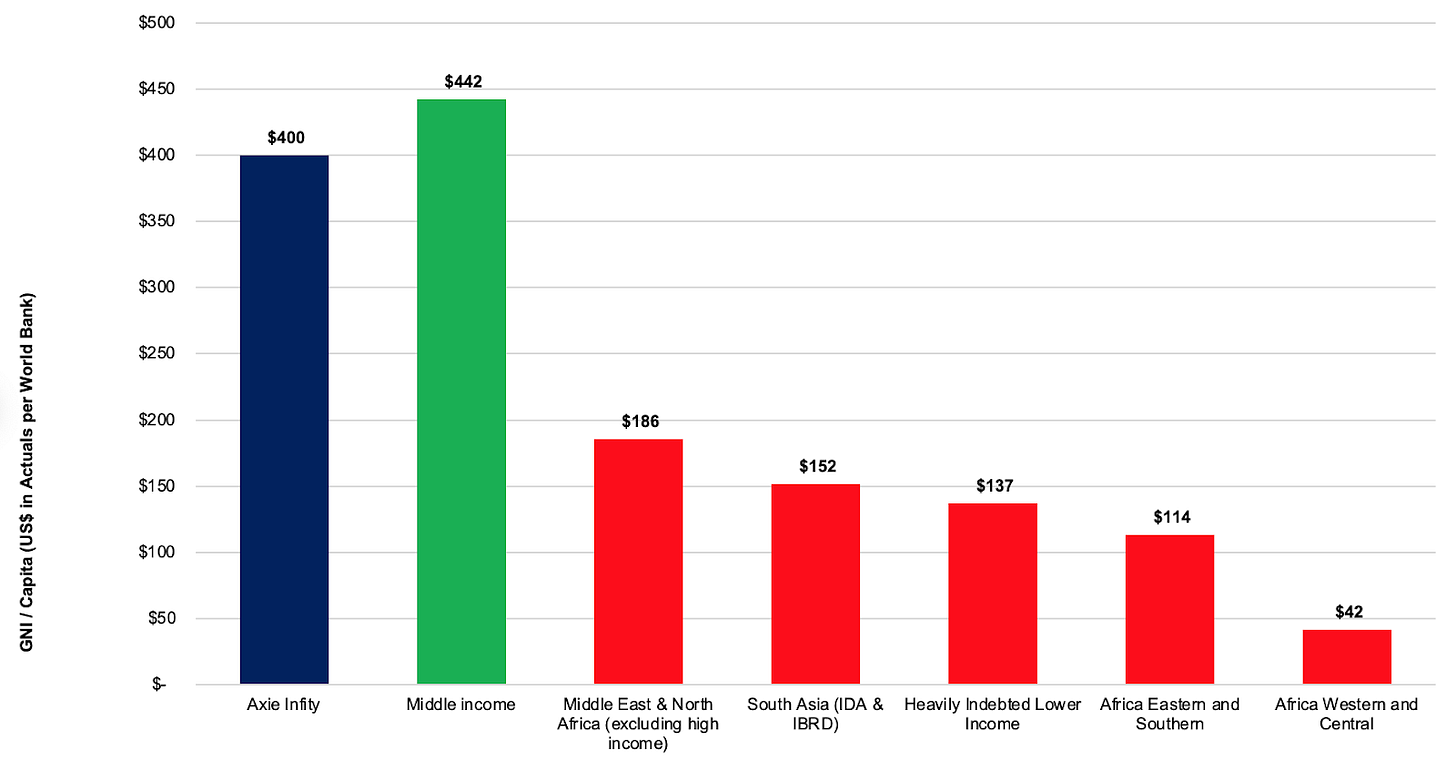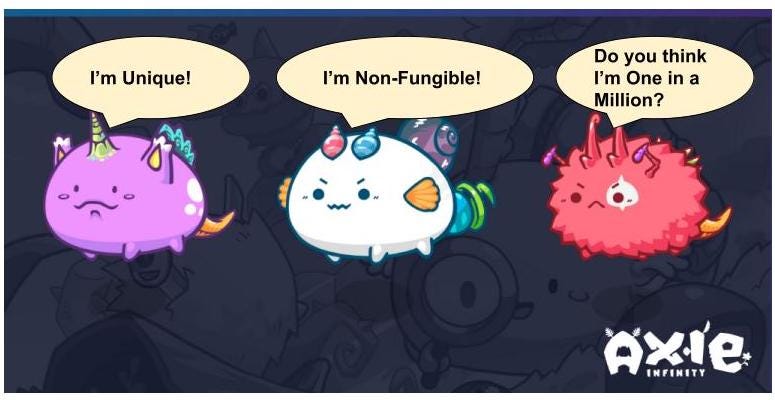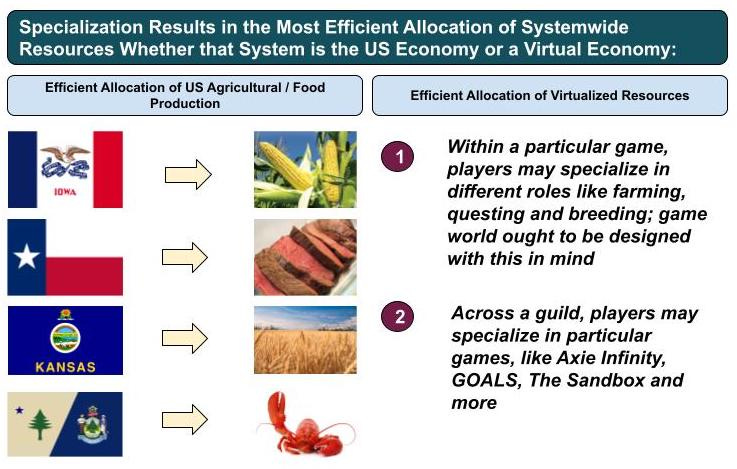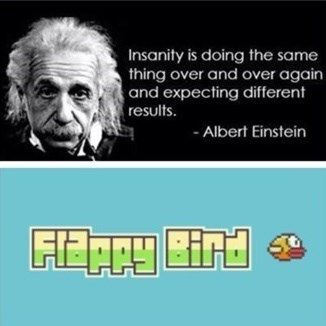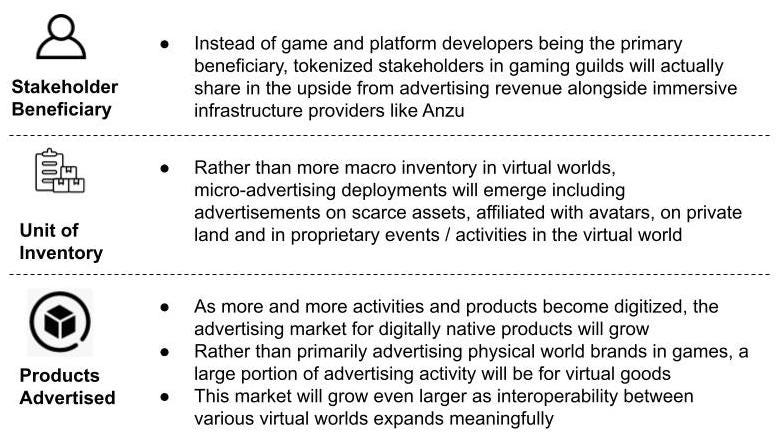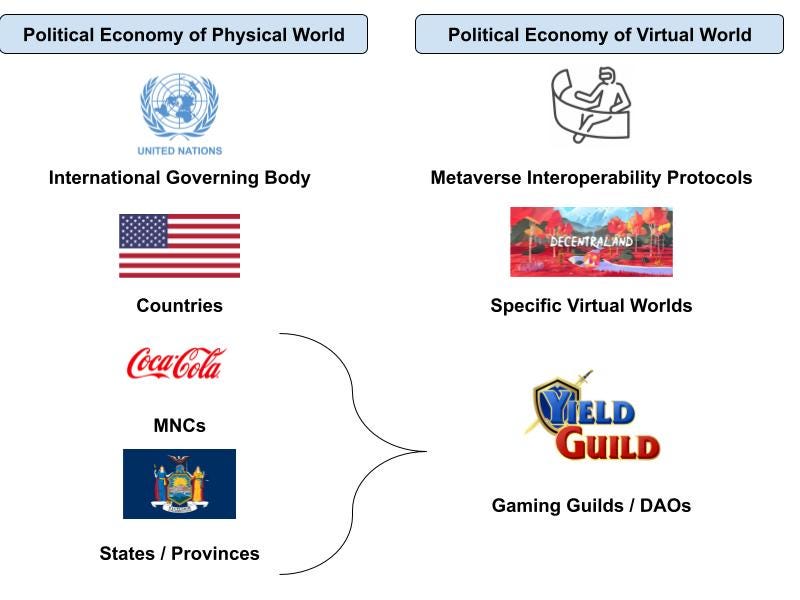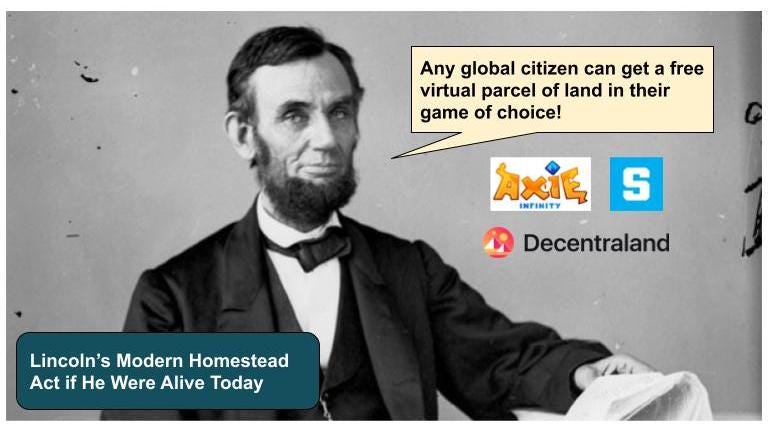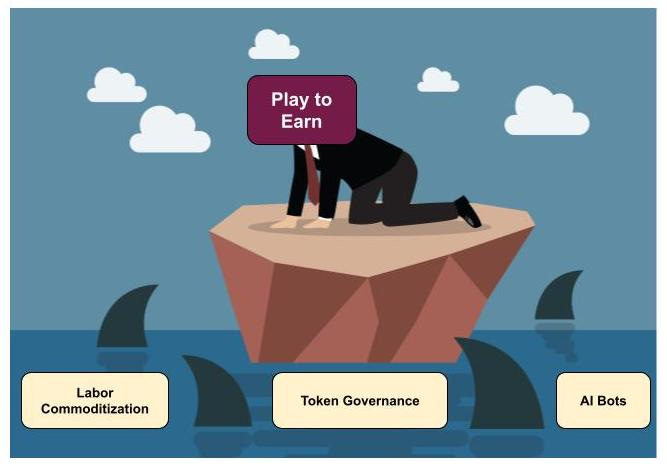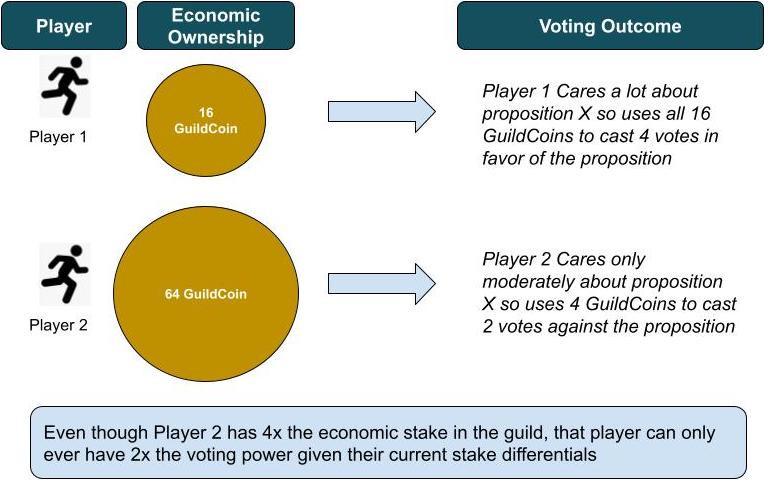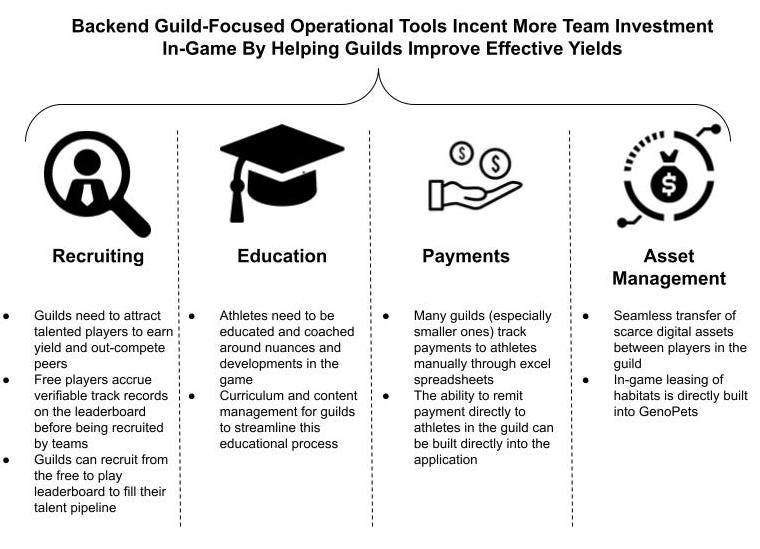Play to Earn is About A lot More than Gaming
Transforming Frontier Markets Through Financial Empowerment and the Political Economy of Play to Earn Ecosystems
This week’s Innovation Armory is a deep dive into the Play to Earn revolution most commonly associated with Axie Infinity and gaming guilds like Yield Guild Games. Thanks so much to George Rzepecki (Founder & Managing Partner of Raba), Cordel Robbin-Coker (CEO & Founder of Carry1st), Albert Chen (CEO & Co-Founder of Genopets), Itamar Benedy (CEO & Founder of Anzu) and Yonatan Raz-Fridman (CEO of Supersocial) for sharing your perspectives for this piece. Read on for more about:
The massive opportunity to leverage the Play to Earn model to elevate emerging market economies particularly across Africa, Southeast Asia and parts of the Middle East
Context on the state of the market in Africa from a leading African gaming expert and the pre-eminent early stage fund in the region
A framework for investors and builders to think about the features of high quality play to earn games including scarcity, economic value, liquidity, real world effort, inclusion and specialization
Weighing the decision to incorporate existing media IP into Play to Earn gaming realms vs. developing new digitally native IP
How Play to Earn is complementary with other gaming monetization strategies including in-game advertising
Evaluating Play to Earn and their guilds from a political perspective and the subsequent digital “wars”, “economic sanctions” and other political events that could stem from them
How the land grab by large guilds in new virtual worlds might be thought of as techno-colonialism at scale under a new framework of digital political economy
The case for a digital revamp of the Homestead Act in virtual economies
An overview of potential threats to Play to Earn and their guilds including Token Governance, Labor Commoditization and AI Bot Proliferation
How Genopets is solving some of these potential constraints through pioneering the “Move to Earn” movement
This is a long post so if your email gets clipped at the bottom make sure to click unclip / visit The Innovation Armory to check out the full read.
If you’re interested in more thought pieces, you can also subscribe below for future updates from The Innovation Armory.
Also, If you like this piece, feel free to share with the link below.
The Play to Earn gaming revolution has the potential to completely transform emerging and frontier markets across the globe. Talent across the world is evenly distributed, but unfortunately economic opportunity today is not, and much of that has to do with the constraints of applying real world industrial age economic models to the rapidly decentralizing digital world:
Clustering employment and high income-earning opportunities in high cost of living cities in the developed world
Cash / wage focused model of compensation rather than a focus on ownership
Centralized financial and economic systems that are slow to change
Play to earn has the potential to shatter these constraints and help build a fairer, more inclusive financial system.
Elevating Emerging Markets Through Virtual World Opportunities
Mobile internet penetration has nearly doubled over the past five years in African nations including Kenya, Tanzania and Sierra Leone. Vietnamese smartphone penetration has risen to 63% in 2020 vs. 35% just five years ago. With rising smartphone and broadband penetration across the globe, emerging virtual economies could become the rails upon which a fairer economic system is built and a playground for incredibly valuable new economic experiments that promote greater financial inclusion.
For those who aren’t familiar with the play-to-earn model, it is a gaming model whereby players are rewarded with financial benefits for actions they perform in virtual worlds, generally through tokenized ownership in NFTs or cryptocurrencies that grow in value as they worlds see more engagement, user growth and subsequent digital economic activity. Yield Guild Games is a pioneer in this space that has built a decentralized autonomous organization (DAO) that primarily earns income today from acquiring scarce assets in virtual worlds which it rents out to its guild members to use to earn other scarce assets and in-game rewards which are shared with members of the guild. Check out their whitepaper for more detail if you’re unfamiliar with their business. You might be thinking: how could the financial potential from playing one of these games as your primary career outweigh the opportunity cost of a more traditional professional path? In which case, I have some fantastic educational material for you to check out:
In fact, on average, Axie Infinity players in the Philippines are making on average $400 / month. If you compare this to a series of regional indices of 2020 Gross National Income (GNI) / Capita per the World Bank, the average Axie Infinity player could have the potential to make meaningfully more than 2x+ per month relative to lower income countries across Africa, South Asia and the Middle East. The index for the World Bank’s definition of “Middle Income” countries only makes 10% more on average. Might some middle income earners across the globe take a 10% short-term pay cut to earn while playing a game rather than their current job which they may not particularly enjoy? Yes seems like a pretty safe bet.
These statistics don’t even totally hit the mark. Even within middle income and higher income countries, there is polarizing income inequality that creates situations where lower earners within a given society could be financially incentivized to join the play to earn economy even if average income is above the $400 threshold. If you dive deeper into these metrics by country, it is clear that the constituent nations in these indices have massive populations of potential players of these games. The 10 countries below, where average monthly GNI / capita is less than current monthly income potential from Axie Infinity, have a population of a whopping 2.7 billion people!
In Africa, in particular, the gaming opportunity is massive and play to earn is an area ripe for exploration. Existing gaming publishers on the continent are in a strong position to leverage their existing distribution, user acquisition and localization capabilities to proliferate play to earn virtual worlds. I caught up with Cordel Robbin-Coker, CEO & Founder of Carry1st, a leading game publisher and digital commerce platform for Africa, to learn more about the African play to earn opportunity and how Carry1st is positioning itself to enable the model:
“We think play-to-earn has tremendous potential for our users who are digital natives with tons of talent and hustle, but limited formal work opportunities. Carry1st is positioning itself to be the go-to partner for crypto game studios looking to scale in Africa, while also providing a robust offramp ecosystem for players to get real-world value from the tokens they earn.”
Some pessimists claim that income potential for individual DAO members could decline as more people flock to the game and that there will be more people / capital chasing compressing yields on scarce digital assets. However, I believe that as more people flock to these virtual economies, they will bring new tasks to be done and income-earning opportunities by building new markets and pockets of economic activity that will counterbalance potential returns compression that may impact the core revenue generating activities of these guilds today.
The income potential is proven in the case of Axie Infinity and the distribution / reach exists in the form of rising mobile phone / broadband penetration in emerging markets. However, there remain some constraints to larger scale adoption including:
Lack of education around the relative income opportunities across virtual worlds; part of this is also a language issue where more investment in gaming has happened in economies traditionally dominated by English speakers
Perceived opportunity cost by gamers who might have to forfeit a local minimum wage job / are unlikely to give up that income stream given a lack of safety net
On the former issue, while there is a lot of global developed nation VC money going into this space, I expect there to be more partnerships with leading local early stage VC firms that will play critical roles in serving as liaisons between these local markets and global growth investors that are trying to build and back products that resonate with local audiences. A couple of top ones by region include The Raba Partnership (Africa), Kaszek Ventures (Latam) and Golden Gate (Southeast Asia). I caught up with George Rzepecki, Founder & Managing Partner at The Raba Partnership about the importance of tailoring distribution and go-to-market strategy to the continent and the rising interest of non-African funds in the continent:
“Just a few years ago, it was unimaginable for partners at venture firms in San Francisco (where I lived and worked for a number of years) to commit significant capital to companies in Africa. It just didn’t happen. I remember sharing Flutterwave’s seed round presentation with a number of firms in 2016 (at the time, Flutterwave had phenomenal traction given the stage), and partners at every firm politely passed. Their decisions were driven by constraints like investing “close to home” and the scarcity of partners motivated to invest in Africa. Making a large investment in an African company would require twenty-five or more hours of travel one way, prescriptions, vaccinations (not for COVID) and significant time away from the home office. It was too easy to just say no, especially since there had not been large venture-backed outcomes coming from Africa, yet. What's changed is that companies are growing and reaching venture scale, and it is now accepted practice to diligence and commit significant capital while never meeting the founders in person. Investing globally has moved from high friction to nearly frictionless. And, unlike other venture ecosystems, Africa has no large multi-stage firms like Hillhouse/IDG in China, Index in Europe, and Kaszek/Monashees in LatAm, so significant funding won’t come from within, for now.“
On the latter issue, Universal Creative Income systems have strong potential to encourage potential players to make the jump by providing “guaranteed income [which] would enable individuals to spend more time on creative pursuits, rather than worrying about being able to meet basic needs.” Li Jin, Founder & Partner at Variant Fund, had an awesome project in regards to UCI for Yield Guild Gaming called the Leaping Corgi Scholarship whereby proceeds of two NFT auctions were used to sponsor Axie Infinity players to give them the financial security to leave their jobs and focus on earning income through Axie Infinity.
Winning Features of Play to Earn Games
The best “Play to Earn” games have some common features that make them particularly conducive to jumpstarting virtual economies. I will analyze Axie Infinity as an example using the below framework of gaming characteristics:
Scarcity of Digital Assets - In order to create the potential for assets in the game to appreciate over time as more users join, it is important that some assets in the game are scarce and that there is limited / controlled supply of certain assets. In Axie infinity, land that you can breed your Axie on is scarce and the SLP tokens used to breed your Axie are also scarce and can only be won through quests, breeding, etc. These tokens are needed to breed new Axies and so input scarcity limits the current supply of Axies even if more are eventually bred over time.
Economic Value - Assets that are owned by guilds / DAOs within the games need to have knowable economic value over time and relative certainty they will remain valuable assuming players continue to game in that virtual world. In Axie Infinity, each Axie that you have can earn in-game rewards which have economic value through battles / quests. Each Axie is also a unique NFT that has value which can be speculated on and appreciate over time. Lastly, the breeding potential and genes of the Axies have value by giving you the ability to breed more Axies.
Real World Effort - to create a “play to earn” economy, the incentive to actually play the game in the real world needs to be embedded in the system design of the game. For Axie Infinity, one can only breed the Axies with tokens won through battles, quests and real game play. This labor / gameplay input that requires time investment to breed an Axie is part of what assigns them value.
Liquidity - marketplaces that allow for the in-game trading of valuable assets is important to help players realize the economic value of the assets they own through play / labor contributions. Moreover, beyond in-game liquidity, without crypto-fiat bridges that provide cash-out points from the game, there is a limited ability for individuals in emerging markets to make use of the economic gains to create a better life for themselves and their families at home. That being said, while these bridges are important, education about the compounding value of these digital assets over time is important to prevent capital flight at a certain point of scale / engagement particularly in emerging market economies. In Axie Infinity, while game play is required to breed Axies and there is a certain amount of scarce land that exists, there is also a marketplace to be able to trade and buy from other players.
Inclusion - at the end of the day, the most successful play to earn games will need to help the widest possible net of users find community and feel at home online in their virtual world. This means creating a game world that does not see race, sexual orientation, or gender, and specifically structuring game mechanisms to downplay demographic features that could possibly become the basis for discrimination.
I caught up with the CEO of Supersocial, Yonatan Raz-Fridman, about his vision for building engaging games that power personal expression and, foster inclusivity as a means of driving prosperity, starting with Ghostopia, a multiplayer RPG built on Roblox:
“We are careful at Supersocial about the principles that guide the type of experiences and worlds that we want to create. In Ghostopia, we have focused on crafting gameplay that empowers players to creatively express their true selves. You become an owner of a lot of land and you get to create your own haunted mansion. Your mansion representation and the items you choose to gather throughout the game are all treated as personal expressions. We view inclusivity as key to enabling personal creativity and are very committed to building inclusivity into the DNA of our virtual worlds. For example, we build in numerous characters that are non-binary. The shopkeeper’s name in the game is Zee, which is completely non-binary. We recently announced a band of three new non-binary characters into the game.
We are also striving to build our other game worlds in a way that would be relevant for people in different types of communities across the globe including Africa, Southeast Asia and Latin America. In Ghostopia, you learn how you manage your resources in-game and how to make a living in the virtual world, which can eventually translate into an actual sense of ownership in your mansion and virtual items. Roblox is introducing infrastructure for asset resell marketplaces and scarce digital items, which we believe could transition Ghostopia’s monetization into a hybrid play to earn model over the long-term.”
Specialization - at the end of the day, play to earn games are like their own standalone economies that just exist in virtual worlds. The global economies in the world today thrive off of a combination of specialization and free trade, which enables a systemwide productivity boost by letting each party add most value in the way they best can and then share that value with others. The best play to earn games in the future will have a diversity of tasks, work, quests and tasks to be done that enable the widest universe of players who join to find unique niches and ways in which they can contribute to their virtual communities of choice.
Interestingly, in the context of traditional games, investors and founders like to tout strong “network effects” to their businesses, basically the idea that the value of their product to each individual user increases meaningfully as each new user is added to the gaming network. Not only do gaming guilds benefit from community effects I laid out in Beyond Network Effects: The Power of Community, their network effects are supercharged by financial incentives. As new players are added to the game, the product value increases to each player but so does their own personal financial / economic value that they derive. Therefore, the lock-in potential once players affiliate community, leisure and concentrate their wealth in particular games is meaningfully higher than a traditional software business with plain old network effects. This creates a situation where it is even more important to move quickly as a first mover in acquiring users before their financial wealth and sense of identity / community is concentrated in other virtual properties, albeit this benefit fades over time as more currency bridges and liquidity mechanisms are built that drive metaverse interoperability. For this new model of gaming, one of the most effective ways to acquire users will be by retrofitting existing IP from earlier generations of games or even from other media IP (movies, comics, etc.) and letting users earn while engaging with IP they already love. One company making interesting moves in this regard is Fancy Bird which is drawing inspiration from the 2013 phenomenon, Flappy Bird. This about wraps up how I felt when I continued to play that game despite losing constantly:
Play to Advertise?
Some industry analyst talk about the debate between “play to earn”, subscription and advertising models as if it is an all or nothing battle for virtual worlds and gaming universes. In fact, advertising-based models of gaming are highly complementary with and will benefit from play to earn models. In-game advertising revenue value today is primarily captured by the game developer who owns the advertising inventory. The largest difference in a blended play to earn / advertising model is that advertising revenue may be shared with more stakeholders in the gaming ecosystem. In a world where decentralized play to earn gaming gains in prevalence, advertising continue to grow as a monetization strategy, but the way it manifests may differ in a couple of key ways: stakeholder beneficiary, unit of inventory, products advertised.
I caught up with Itamar Benedy, CEO & Founder of Anzu, the leading blended reality in-game advertising provider, to learn more about how advertising models can benefit from a rise in select play to earn monetization models:
“The play-to-earn model is an indication of how advanced and scalable the gaming economy is, and it perfectly compliments in-game advertising. Brands want to be where their customers are and they are increasingly interested in gaming because that’s where a lot of us are spending our free time - and in the case of play-to-earn we’re seeing people give up their day jobs to dedicate whole days to these games because they are more financially beneficial.
In-game advertising benefits all parties including the gamers, allowing them to save money on their favorite titles. Play-to-earn takes this a step further and allows them to not only save but earn money. The blockchain technology that many of these games are built on will help to ensure that any money earned remains within the ecosystem, benefiting the players and the game worlds that they inhabit.”
The International Relations of of Gaming Guilds / DAOs and Developers
From Article 1 of its Charter, the mission of the United Nations is:
“To maintain international peace and security, and to that end: to take effective collective measures for the prevention and removal of threats to the peace, and for the suppression of acts of aggression or other breaches of the peace.”
The emerging interconnectivity / interoperability of virtual worlds (e.g. the metaverse) is like an international organizing body (similar to the UN). Individual gaming universes are like countries / nations. I was tempted to call Gaming Guilds / DAOs states, but that term misses the mark. While states are subject to the sovereign rules of a country (as DAOs operate within the confines of a game), political states are also statically restricted to the confines of the geography of a singular country. However, like a multinational corporation (MNC), DAOs operate across countries. Unlike a corporate though whose interests and activities are primarily financial and economic, guilds / DAOs have the potential to coordinate political, community and economic activities.
The best way to understand a DAO is as a multinational state (MNS) that exists as an independent entity that straddles sovereign virtual worlds.
There will inevitably emerge numerous scaled competitors to Yield Guild that appear both in the virtual worlds where they play today but also across other virtual worlds. These gaming guilds / DAOs will increasingly house more and more economic and financial activity as more economic opportunity arises in the metaverse. Therefore, each DAO / gaming guild and their constituent members will become more financially incentivized over time to claim scarce assets, digital land and add members by whatever means available. While a lot of thought is going into system design for individual DAOs to ensure alignment of incentives between participants, we also collectively need to start thinking about governance mechanisms between gaming guilds / DAOs to adjudicate conflicts that will eventually arise at scale. Perhaps this adjudication will occur through real world governing bodies like the UN or within the confines of a particular sovereign government. I think more likely is that the digital-first nature of the metaverse slowly develops its own kind of political economy over time.
What will govern the relationship between developers and gaming guilds / DAOs? Take Axie Infinity: Let’s say a guild amasses enough power within the game that it touches a majority of economic activity that happens in that virtual world. At that point, can the guild revolt and re-write the rules to further entrench their economic dominance? Does the guild take over as developer? Maybe that is the point at which we realize the metaverse, when the underlying developer becomes irrelevant and when a cross-game guild (or a couple of them) have such a disproportionate amount of leverage in these games that they can force interoperability as multinational state hegemons of the virtual world.
Political science is a useful lens to think about framing the types of conflicts that might exist between standalone guilds and possibly even developers as well:
Will DAOs go to “war” with each other in a digital sense with digital WMDs (cyberattacks, hacks, bots, etc.) if they can’t arrive at mutually agreeable outcomes through peaceful means? We might have a literal war over war games like Call of Duty?
I expect we will also see a form of digital “economic sanctions” that emerge. Certain DAOs / gaming guilds through democratic consensus may pass rules enforced through smart contracts that restrict exchanging scarce digital assets, in-game rewards or tokens with members of a DAO deemed competitive
Some guilds are starting to invest in and form agreements to get pre / exclusive access to acquiring land in new virtual worlds. If you think about the metaverse as an emerging political economy, I think it’s interesting to consider whether this is potentially a form of techno-colonialism, imposing the will of an existing DAO on a new game / virtual world that may have a distinct communal identity:
First, because all of these virtual worlds are created so recently, I don’t think any group of people has an indigenous claim to these worlds in the same way that groups that lived on earth for hundreds of years in specific geographies do
Second, people can (or will in an interoperable metaverse) be able to frictionlessly move between virtual worlds or choose to opt out of playing a game (especially at the early stage of a game where their wealth isn’t necessarily tied up in the virtual world) whereas people can’t necessarily move as freely dependent on socioeconomic factors in the real world
Lastly and most saliently, I actually believe that this type of virtual world expansion could be a positive force in the world whereas colonialism is and was of course negative. In End of the Myth, Greg Grandin argues that much of the conflict that exists in the developed world today comes from a perceived sense of scarcity relative to the era of imperial expansion and the US’ westward expansion through slogans of “manifest destiny”. Through the Homestead Act, as we expanded West, Americans could claim an abundance of land if they made the journey across the country. This was unfair at the time because it excluded women and minority groups from claiming land. However, the way we dealt with scarcity historically as a country was to expand our border. As a nation of human rights advocates that has thankfully evolved been beyond imperialism in the modern era, I view technology as the key means through which we expand our frontier. In the virtual world, the ability to theoretically expand the digital frontier for everyone (regardless of race, nationality, gender, sexual orientation or any specific demographic factors) to create abundance could be a positive force in limiting real world violence and conflict. One word of caution: If we do get to a point where we can create virtual humans that have a level consciousness that resembles our own, this argument does not hold because we might assign real moral weight to virtual conflict with virtual humans at that point in time. I also wouldn’t be surprised if gaming worlds / DAOs offer Homestead type initiatives to encourage gamers to come and settle their virtual world before beginning to charge for parcels of virtual land. If governments actually stayed ahead of technology trends, they might consider mandating these sorts of initiatives!
Threats to the Play to Earn Movement
While I am a big proponent of the play to earn movement, I believe there are three primary threats to the play to earn movement that the community needs to keep in mind as more gaming guilds scale over time: Governance, Labor Commoditization and AI Bots. With the right system design, incentive alignment and technological innovations, these risks need not be existential. I’ve excluded regulatory risk from this section because this is not unique to play to earn gaming and applies more broadly to the crypto space.
A. Governance - Many DAOs and Guilds are already making sure they set aside a large portion of tokens to community initiatives to ensure that investors don’t end up controlling these DAOs and imposing their unilateral, centralized vision on them. Yield Guild, for example, is setting aside 45% of its governance tokens to the community:
While I do believe founders, investors and advisors who actively help build out the guild and take a disproportionate amount of risk upfront should be economically incentivized with a higher financial upside, I don’t believe that political / voting power in the DAO should scale linearly with economic ownership. Rather, these gaming guilds ought to employ a quadratic voting system for any referendums that relate to governance and strategic changes. In a quadratic voting system, voters are assigned credits that they are able to allocate to specific votes for particular policy referendums, with each vote being the square root of the number of credits contributed. Let’s look at a theoretical example for a gaming guild:
This governance system has the following advantages vs. tying referendum votes purely to economic ownership in the guild:
Lets guild members express the strength of their preference by casting multiple votes on referendums they care a lot about. This helps protect the rights of minorities in the guild who can band together and pool votes on initiatives particularly important for their specific micro-communities
Mitigates impact of wealth accumulation on political decision-making
Is fair by still giving those who have risked more economically in the DAO a moderately greater (but constrained) ability to impact political outcomes that becomes exponentially more expensive with each vote they want to cast
If wealth accumulation is not constrained from impacting the politics of the guild disproportionately, then those who accumulate more wealth at the birth of the DAO (investors and founders) may be incentivized to try to introduce and pass referendums that preserve their status at the top of the guild.
These guilds are not purely economic organizations, they are political bodies whose smart contracts effectively represent a series of social contracts with constituents. As with any political body, if voting governance is not handled properly, and money is allowed to pollute politics, it can result in a situation where those in power are incentivized to suppress the voting power of others on the basis of political disagreement, greed or discrimination.
B. Labor Commoditization - certain other movements that have involved a more distributed workforce have actually disempowered labor in certain ways, specifically gig economy businesses like Uber. Many of the gig economy business models have actually served to commoditize labor by disrupting business models where individuals controlled a revenue-generating client relationship (e.g. cab-driving) and substituting the consumer relationship with Uber as a brand. It is important to ensure that the “play to earn” movement in gaming does not similarly commoditize labor at scale:
Proper governance like quadratic voting discussed in section A will help ensure that the wealthiest members of the guild don’t expropriate the least wealthy members
In gaming guilds, the unit of compensation is tokenized equity in the guild vs. cash compensation. In the case of Uber, driver wages don’t necessarily rise the better that Uber does as a company, but in the case of the guilds, gamer token incentives and NFTs become more valuable as the DAO grows
Guilds will inevitably have different tiers of players and lower tiers ought to have robust player unions for purposes of organization. Plus, I think it is interesting to consider granting those least wealthy / most vulnerable in the guild some sort of supermajority veto power as part of governance mechanics
The upward mobility opportunities in gig economy businesses like Uber are severely limited for drivers. The games in which guilds operate ought to all be open source (which many today are) so that players can create their own in-game innovations to create additional tasks to be done in-game that become new wealth creation / upward mobility opportunities
C. AI Bots - As advanced AI technologies proliferate, for example when OpenAI allows more developers to build with GPT-3, there will be greater potential for bad actors to create bots to infiltrate video games, potentially automating and optimizing certains tasks and quests that can be used to create economic value. For example, what if programmers could develop AI bots in Axie Infinity that could be trained to win battles in lieu of real humans? In that case, bots and bad actors that create them could extract economic value away from hardworking gamers in the guild. There needs to be meaningfully more investment in sophisticated bot detection systems as bots get more advanced and potentially an incremental KYC / identity attribution layer to help verify that it is actually a human playing. Alternatively, I believe there are ways of building this human vs. bot verification into the DNA of tasks to be done in the game. More on this in the next section. How many bots does it take to break a play to earn game?
Move to Earn: How Genopets is Improving System Design
As of September 2021, the average price of buying an Axie on Axie Infinity was between $350-$400 with many meaningfully more expensive. The cost to start is team is generally over $1,000. To participate in the Axie economy, you either need to purchase one standalone or be gifted / lease an Axie from a gaming guild. The lack of a free to play option / entry point has the following implications:
Over time, it has the potential to exclude more individuals from the economy and / or concentrate power in guilds that entered early. More inclusion is better at scale from a governance perspective
Give more power to individuals in the economy who have invested more capital upfront to acquire a scarce number of Axies to the detriment of the “labor” that is actually competing in battles and quests. Adequately addressing this issue is important to preventing the labor commoditization reference in the prior section
Therefore, in my opinion, it is important to have a free entrypoint option in conjunction with paid opportunities in order to create the healthiest and most sustainable governance and labor dynamics over the long-term.
Genopets is the pioneer in the “move-to-earn” space. A player can mint an NFT Genopet for free and evolve and power up their Genopet by earning XP in battles, quests and more:
Players earn XP and Gene Crystals to evolve their Genopet by integrating data from their mobile device for wearable devices to prove that they are completing real life movement related to fitness tasks. This helps evolve their Genopet so it is stronger, wins more frequently in battles and thereby helps it to appreciate in value.
Genopets also allows players to purchase “Habitats” that give them special effects to build Genopet skills and special access to Gene Crystals, which can provide evolutionary advantages to a player’s Genopet.
Genopets’ model is more sustainable because of its dual earning economy. Talented and motivated players who may be cash strapped can still participate in the economy and accrue value based on the merit of their own game play through a free-to-play option. However, the “Habitats” also allow individuals to invest more capital in the ecosystem to gain a relative advantage to evolve faster if they’d like. This invention of a dual earning economy mitigates any potential risk of token hyper-inflation relative to purely free-to-play games, but is also more inclusive than pure pay-to-play models. In this way, the Genopet model can attract capital and build value with mechanics similar to the Axie ecosystem, but share financial value in the game in a more inclusive way that is better from a governance perspective and has limited risk of commoditizing “labor” / free players in the game. Moreover, “Move to Earn” rather than “Play to Earn” as a category has the benefit of being able to verify that a player is a real human by integrating with step tracking to register IRL movements. Say bye bye to the worries of AI bots infiltrating the ecosystem:
Interestingly, as gaming guilds become more prominent in play to earn gaming, Genopets is also developing backend tools to specifically attract guilds by easing their game operations. You can think about these in-game operational improvements for guilds as opportunities to improve yield on their investment in the game. A couple of examples include: recruitment, payment remittance, digital asset management and education:
I caught up with Albert Chen, CEO of Genopets, to learn more about the vision behind Genpets' “Move to Earn” model and their recent partnership with Yield Guild Games, whereby YGG both purchased a block of governance tokens and minted the first-ever YGG branded Habitat NFTs to provide their scholars a headstart in the Genoverse:
“The idea for Genopets was born from our prior work in digital health exploring ways to provide passive income to individuals as an incentive to stay physically active,” said Albert Chen, co-founder and CEO of Genopets. “Through the years, we remained steadfast in our vision for health-enabled passive income. We have been very blessed by the Play-to-Earn narrative tailwind and are excited to have the support and experience of Konvoy Ventures and Pantera Capital on our side as we revolutionize the intersection of Gaming and NFTs.” With regards to their recent partnership with YGG, Albert said: “YGG is our first guild partnership. From the start, our vision to bridge value in the digital and physical worlds through Move-to-Earn has been attuned to YGG’s mission to create value in the virtual world. It feels good to know that YGG and Genopets can have a positive impact on society by rewarding people for staying active.”
All Innovation Armory publications and the views and opinions expressed at, or through, this site belong solely to the blog owner and his guests and do not represent those of people, employers, institutions or organizations that the owner may or may not be associated with in a professional or personal capacity. All liability with respect to the actions taken or not taken based on the contents of this site are hereby expressly disclaimed. These publications are the blog owners’ personal opinions and are not meant to be relied upon as a basis for investment decisions.




